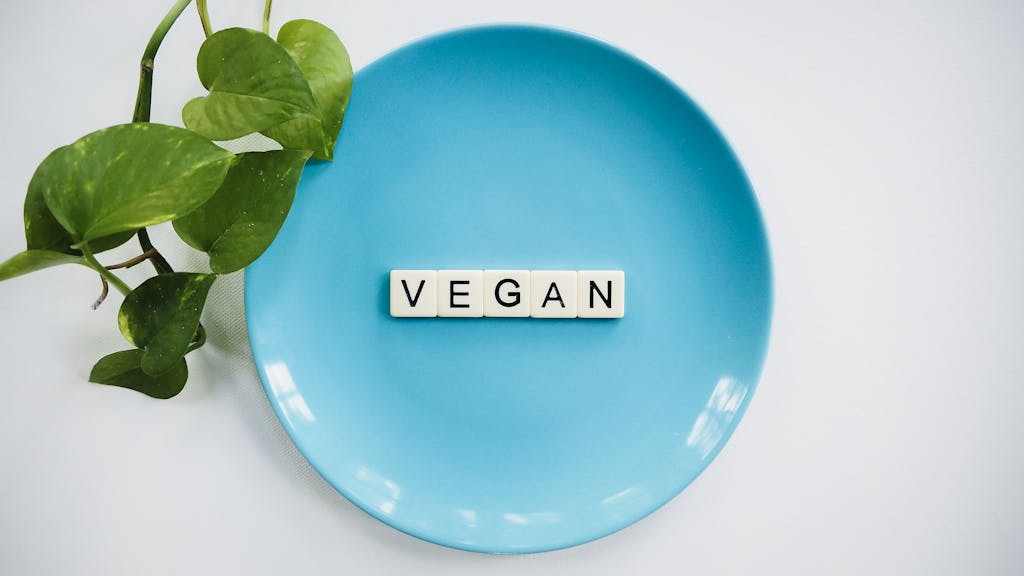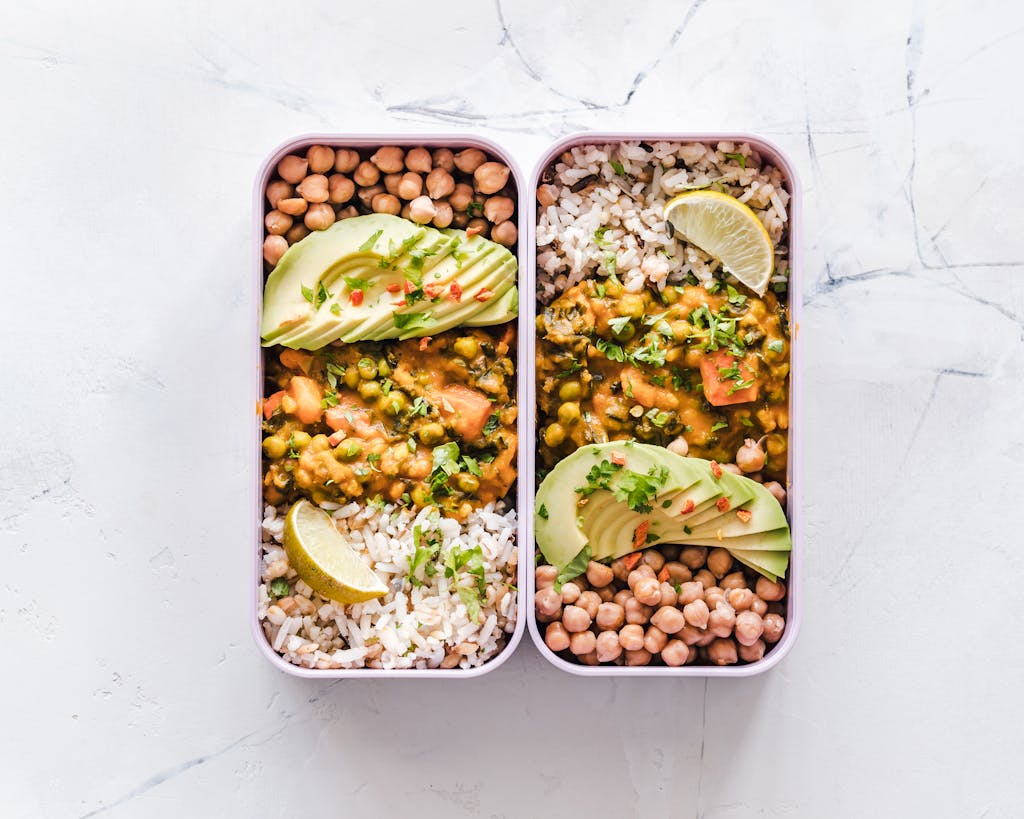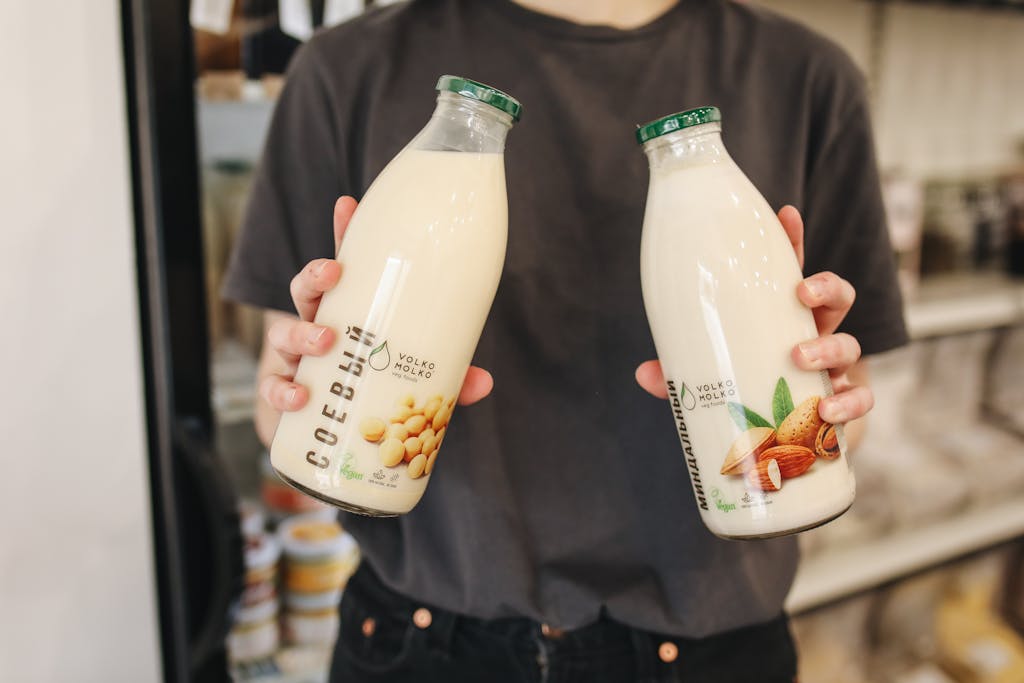What do vegans eat?
If you’ve ever wondered what vegans eat instead of meat, read on.
Table of Contents
- Intro
- Most Common Vegan Foods
- Meat Substitutes
- Alternatives to Dairy
- Egg Replacements
- Frequently Asked Questions

Once people discover we’re vegan, the common question they ask is, “What can vegans eat?” It’s a funny thing to think about, because the answer is simple: vegans can eat almost everything.
Vegans can eat every fruit, vegetable, bean, nut, or seed considered edible by humans. The only things we leave out of our diet are products made of, and by, animals.
Contrary to popular belief, veganism is not about deprivation – there is an abundance of variety in vegan meals. In this guide, we’ll explore the wide array of foods available to vegans, including staples, meat substitutes, dairy alternatives, and egg replacements.
The Most Common Vegan Foods

Vegans have an extensive selection of foods to choose from, including:
Fruits and Vegetables: They are the foundation of a good vegan diet, and they provide a host of nutrients, including and abundance of vitamins, minerals, and antioxidants.
Grains and Legumes: Grains and legumes are essential sources of carbs, protein, fiber, and other micronutrients.
Common grains include rice, quinoa, barley, and oats, while legumes include beans, lentils, chickpeas, and peas. They can be used in a variety of dishes, such as salads, soups, stews, and stir-fries.
Nuts and Seeds: Nuts and seeds are nutrient-dense and packed with healthy fats, protein, fiber, vitamins, and minerals.
Almonds, walnuts, cashews, pumpkin seeds, sunflower seeds, and lots of others add calories and balance to a vegan diet. They can be enjoyed as snacks, added to salads, used in baked goods, or turned into creamy nut butters and spreads.
Herbs and Spices: Herbs and spices add flavor and micronutrients to vegan dishes without relying on animal products. The options are endless, and many can be combined to recreate the flavors of your favorite cuisines. They add depth and complexity to soups, sauces, marinades, and dressings and make vegan meals tasty and satisfying.
Meat Substitutes
Meat substitutes offer familiar textures and flavors for those transitioning from an omnivorous diet or experiencing cravings. They’re not essential for a vegan diet, but can be a fun change of from time to time. Some popular options include:
- Tofu: Made from soybeans, tofu is super versatile. It has a neutral taste that absorbs marinades and seasonings well. It can be grilled, baked, stir-fried, or blended into smoothies and desserts.
- Tempeh: A fermented soy product, tempeh has a nutty, sometimes bitter, flavor and firm texture, making it ideal for grilling, sautéing, or crumbling into salads and sandwiches. Most people recommend steaming raw tempeh before cooking to remove the bitterness.
- Seitan: Also known as wheat gluten, seitan has a meat-like texture and can be seasoned and cooked in a variety of ways, including grilling, braising, and frying.
- Textured Vegetable Protein (TVP): TVP is a soy-based product that mimics the texture of ground meat when rehydrated. It is most often used in dishes like chili, tacos, and spaghetti sauce.
- Plant-Based Burgers: Plant-based burgers have become increasingly popular, offering a meaty taste and texture without the use of animal products. The Beyond and Impossible burger crazes have proven such products have wide appeal, even among meat eaters.
Dairy Alternatives

Milk and cheese are two reasons why even some vegetarians say they could never go vegan. Though old-school dairy substitutes were tough to swallow, modern advances have led to products that are just as enjoyable as the milk-based products many remember. Some of the most popular are:
- Plant-Based Milks: Made from almonds, soy, oats, coconut, rice, or hemp, plant-based milks can be used in coffee, cereal, smoothies, and baking.
- Vegan Cheese: Vegan cheese is made from nuts, soy, or coconut and can be used for everything from topping pizza to high-end “charcuterie” boards.
- Non-Dairy Yogurt: Made from soy, coconut, almond, or cashews, non-dairy yogurts come in a variety of flavors and textures.
- Dairy-Free Butter: Plant-based spreads are suitable substitutes for butter in cooking, baking, and spreading on bread.
Egg Replacements

Whether you’re seeking to bind your favorite dessert, or cook a healthy breakfast, eggs are probably in your non-vegan recipe repertoire. When making the switch to plant-based food, eggs can be easily replaced in vegan recipes using:
- Flax or Chia Seeds: Mixing ground flaxseeds or chia seeds with water creates a gel-like consistency similar to eggs, suitable for binding and leavening.
- Silken Tofu: Blending silken tofu creates a creamy texture that can mimic eggs in dishes like quiches, custards, and scrambles.
- Chickpea Flour: Chickpeas and their cooking liquid (called aquafaba) can be used to whip up an awesome vegan omelette in no time.
- Commercial Egg Replacers: Several commercial egg replacers and powdered substitutes are available for baking and cooking.
Frequently Asked Questions (FAQs)
- Are all fruits and vegetables vegan?
Yes, all fruits and vegetables are vegan in their natural state. Processed fruits and veggies should be checked to be sure. - Can vegans eat bread?
Most bread is vegan, but some include eggs or dairy in their ingredients. Be sure to check the label. - What about vegan desserts?
There are lots of vegan dessert options available, including cakes, cookies, pies, and ice cream. Some are even accidentally vegan, like the original Oreos. When in doubt, ask or check the ingredients. - Is honey vegan?
Honey is made by bees, so it is not considered vegan by most vegans. However, it’s a hotly debated topic in vegan ethics circles. - Are there vegan options at restaurants?
Many restaurants offer vegan-friendly options, including salads, veggie burgers, pasta dishes, and stir-fries. Depending on where you live, there may even be all-vegan restaurants. Search for options before you hit the town. - How do vegans ensure they get enough nutrients?
Vegans can meet our nutritional needs by consuming a varied diet rich in fruits, vegetables, grains, legumes, nuts, and seeds. It’s important to supplement with vitamin B12 and vitamin D and omega-3 fatty acids, as these nutrients are more difficult to derive from plant-based foods. - Can vegans eat processed foods?
Some, but not all, processed foods are vegan, so it’s important to read labels carefully and make sure they don’t contain hidden animal ingredients or additives. - Can vegans eat out at fast-food restaurants?
As veganism has become more popular, many fast-food chains have begun to offer vegan options like veggie burgers, salads, and more.
However, cross-contamination is a concern – are the veggie burgers cooked on the same grill, for example. It’s best to ask about cooking methods and prep before ordering.
Wrapping Up
The truth is, a vegan diet can be as rich and varied as an omnivorous one. In fact, it’s often moreso. Vegans who eat a whole foods, plant-based diet aren’t starving, or nutritionally deficient. Our culinary lives are full of adventure. Grab a plate – there’s lots to enjoy!